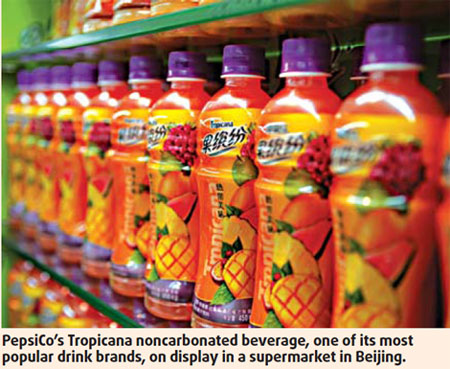


Though Indra Nooyi has made many difficult decisions during her executive career, she says the decision to invest in China was an easy one.
The CEO and chairwoman of PepsiCo, one of the world largest food and beverage companies, announced on November 3 that it plans to invest $1 billion in China over the next four years as part of the company's ongoing strategy to expand emerging markets and broaden its portfolio of locally relevant products.
"This is our largest investment in China in the nearly 30 years we have been doing business here, and it is consistent with our broader global strategy of investing in high-growth developing markets," she says.
China today is PepsiCo's No 1 market and still growing fast. And because of 1.3 billion people and continuous economic growth here, making a decision to put money here is easy and natural, according to Nooyi.
"More importantly I think the Chinese economy is managed very well, which provides a bullish prospect for all companies. China could be a most powerful economy for the next five to 10 years. We tend to participate fully into China," she says.
PepsiCo's investment in China will focus on expanding its manufacturing capacity, particularly in the country's under-exploited middle and western regions. Funds will be also used to strengthen local research and development facilities and build the company's sales force to broaden product distribution. Brand-building initiatives as well as development of new products tailored to China consumers, such as Chinese traditional herb drinks, are also included.
Meanwhile, the Fortune 500 company says it will strengthen its efforts in China to promote environmental sustainability, especially relating to local agriculture and resources conservation, and to support community-focused programs.
PepsiCo's investment move is a common strategy for transnational companies who want to find new growth engine in developing economies amid the global economic slowdown in the developed marketplaces of the US and Europe, analysts say.
"For PepsiCo, it is, to some extent, a competing strategy with its global archrival Coca-Cola," notes vice general manager of Shanghai MEGI Consulting Firm Ma Bin, who has been studying the global beverage market for over decade.
Coca-Cola on September 3, 2008, announced a $2.4 billion takeover of Beijing-based China Huiyuan Juice Group, the leading juice maker in the country. The deal, subject to regulatory approval, would be the largest ever for Coke in China and is a clear sign that Coke would like to further expand into the Chinese noncarbonated drink market. Coca-Cola has already said that if the bid is approved, it plans to continue using the Huiyuan brand.
PepsiCo is a master at mergers and acquisition in the international market, while Nooyi says her company has opted for another way in China so far.
"I think there are two ways (for the multinationals) to grow in China, they can buy or invest, and we have chosen to invest. We believe that's more value-creating in China at this point," she says.
The US-based company does not expect a return immediately for the huge investment.
"It's a long-term investment ... When we invest in agriculture or R&D, we don't expect a return immediately, so all of the return will come in five to 10 years," Nooyi adds.
China is one of PepsiCo's fastest-growing international markets. Many of its most prominent brands are produced and sold here, include Pepsi, Frito-Lay snacks, Tropicana juices, Quaker foods and Gatorade sports drinks.
(China Daily 11/10/2008 page12)













